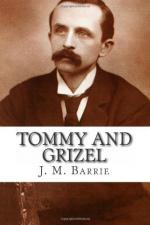“Whether his name will march down the ages is not for us, his contemporaries, to determine. He had the most modest opinion of his own work, and was humbled rather than elated when he heard it praised. No one ever loved praise less; to be pointed at as a man of distinction was abhorrent to his shrinking nature; he seldom, indeed, knew that he was being pointed at, for his eyes were ever on the ground. He set no great store by the remarkable popularity of his works. ‘Nothing,’ he has been heard to say to one of those gushing ladies who were his aversion, ’nothing will so certainly perish as the talk of the town.’ It may be so, but if so, the greater the pity that he has gone from among us before he had time to put the coping-stone upon his work. There is a beautiful passage in one of his own books in which he sees the spirits of gallant youth who died too young for immortality haunting the portals of the Elysian Fields, and the great shades come to the portal and talk with them. We venture to say that he is at least one of these.”
What was the individuality behind the work? They discussed it in leading articles and in the correspondence columns, and the man proved to be greater than his books. His distaste for admiration is again and again insisted on and illustrated by many characteristic anecdotes. He owed much to his parents, though he had the misfortune to lose them when he was but a child. “Little is known of his father, but we understand that he was a retired military officer in easy circumstances. The mother was a canny Scotchwoman of lowly birth, conspicuous for her devoutness even in a land where it is everyone’s birthright, and on their marriage, which was a singularly happy one, they settled in London, going little into society, the world forgetting, by the world forgot, and devoting themselves to each other and to their two children. Of these Thomas was the elder, and as the twig was early bent so did the tree incline. From his earliest years he was noted for the modesty which those who remember his boyhood in Scotland (whither the children went to an uncle on the death of their parents) still speak of with glistening eyes. In another column will be found some interesting recollections of Mr. Sandys by his old schoolmaster, Mr. David Cathro, M.A., who testifies with natural pride to the industry and amiability of his famous pupil. ‘To know him,’ says Mr. Cathro, ‘was to love him.’”




